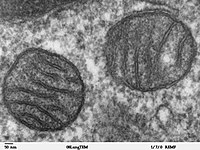
Photo from wikipedia
Ischaemia, followed by reperfusion, causes the generation of reactive oxygen species, overproduction of peroxynitrite, activation of matrix metalloproteinases (MMPs), and subsequently the degradation of heart contractile proteins in the cardiomyocytes.… Click to show full abstract
Ischaemia, followed by reperfusion, causes the generation of reactive oxygen species, overproduction of peroxynitrite, activation of matrix metalloproteinases (MMPs), and subsequently the degradation of heart contractile proteins in the cardiomyocytes. Klotho is a membrane-bound or soluble protein that regulates mineral metabolism and has antioxidative activity. This study aimed to examine the influence of Klotho protein on the MMP-mediated degradation of contractile proteins during ischaemia/reperfusion injury (IRI) to the cardiomyocytes. Human cardiac myocytes (HCM) underwent in vitro chemical IRI (with sodium cyanide and deoxyglucose), with or without the administration of recombinant Klotho protein. The expression of MMP genes, the expression and activity of MMP proteins, as well as the level of contractile proteins such as myosin light chain 1 (MLC1) and troponin I (TnI) in HCM were measured. Administration of Klotho protein resulted in a decreased activity of MMP-2 and reduced the release of MLC1 and TnI that followed in cells subjected to IRI. Thus, Klotho protein contributes to the inhibition of MMP-dependent degradation of contractile proteins and prevents injury to the cardiomyocytes during IRI.
Journal Title: International Journal of Molecular Sciences
Year Published: 2022
Link to full text (if available)
Share on Social Media: Sign Up to like & get
recommendations!